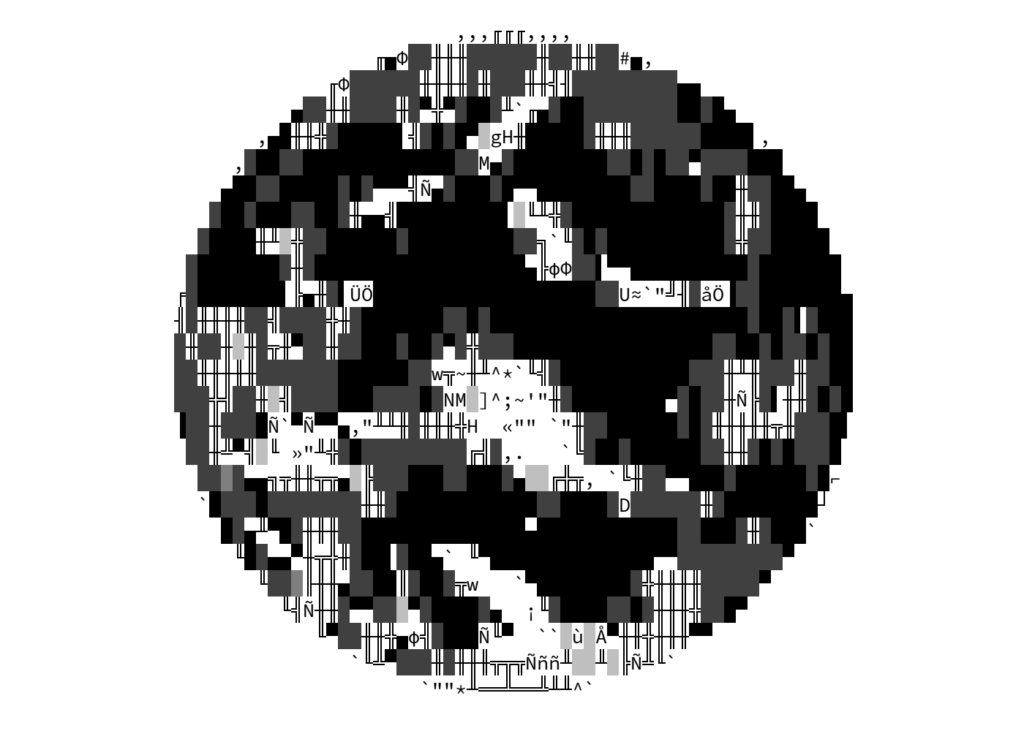An Annotated Bibliography for Digital Discomfort
Cell for Digital Discomfort
This annotated bibliography has been put together by the Cell for Digital Discomfort (Cristina Cochior, Karl Moubarak, Jara Rocha). It gathers writings which both imagine and provide frameworks for new forms of sociotechnical implicancies and digital roughness, disobedience, friction and/or discomfort; among them: a text by the oracle(s) group which calls for stochastic means of undoing the world’s systems of control; an essay from writer, journalist, and academic Syed Mustafa Ali which seeks a vocabulary to define decolonial computing; and, from sociologist and historian of technology Janet Vertesi, a call for a seamful response to glistening tech-cleanliness which makes clear the gritty overlaps of its infrastructures. Elsewhere in the bibliography, texts touch on concepts around radical computing that are as practical as they are speculative, looking into informatics, nonlocality, hostipitality, and the issues of cis-temic oppression and euro-white tech hegemony.
An Annotated Bibliography for Digital Discomfort
oracle(s) (Ren Loren Britton, Romi Ron Morrison, Helen Pritchard, and Eric Snodgrass), “Stochastic enumeration: we don’t want methods but we do want to practice,” nocturnes 2021), https://lorenbritton.com/media/pages/texts/oracle-s-stochastic-enumeration-we-don-t-want-methods-but-we-do-want-to-practice/4288995753-1637606991/oracles_stochastic-enumeration.pdf.
Speaking nearby (Trinh T. Minh-ha), a non-methodology that facilitates a wider amount of options and a smaller inclination towards determinacy, the oracle(s) group apply their bibliomancy facilitating a “skeleton architecture” (Audre Lorde) working with two sources: poet and scholar Alexis Pauline Gumbs’s M Archive: After the End of the World (2018); and their own collective notes. The recorded result of such becoming-undone-together praxis is poethic (Denise Ferreira da Silva) and oracular, radically committed to unknowing the world’s system and its ruling knowledge systems. It is not a methodology for worlding, but still takes the risk, in the queerest sense.
The Institute for Technology in the Public Interest, Counter-Cloud Action Plan: NEoN Digital Ethics Audit (Self-published, 2022), https://titipi.org/pub/Counter_Cloud_Action_Plan.pdf.
A digital audit commissioned by NeON, a small digital arts charity, gave rise to a whole action plan of specific operations around the vortex question of what it means to say “Digitally Ethical”. Such operations involve a set of practices to counter the cloud as the hegemonic paradigm of contemporary computation: slogans to take away, workshop scripts, and organizational suggestions by the Institute for Technology in the Public Interest and their peers. It is probably one of the most exciting models for extitutional generativity of our times, offering oblique and grounded entry points into complex sociotechnical entanglements, thus avoiding the rigidity of belonging-exclusion that institutions often arrange themselves around.
Roel Roscam Abbing and Aymeric Mansoux, “Seven Theses on the Fediverse and the Becoming of FLOSS,” in The Eternal Network: The Ends and Becomings of Network Culture, Kristoffer Gansing and Inga Luchs, eds. (Amsterdam and Berlin: Institute for Network Cultures and transmediale e.V., 2020), pp. 124–140, https://monoskop.org/images/c/cc/Mansoux_Aymeric_Abbing_Roel_Roscam_ 2020_Seven_Theses_on_the_Fediverse_and_the_Becoming_of_FLOSS.pdf
Decentralization and interoperability are two connecting values of a very diverse constellation of the alternative social media infrastructures of something known as “the Fediverse”—a neologism combining “federation” and “universe.” Media theorists Roel Roscam Abbing and Aymeric Mansoux consider the potential for the Fediverse to undo the decoupling of matters of infrastructure and social organization by recovering agency for users, as well as through the problematizing of ideas of openness, universal access, and apolitical engineering—ideas which are prevalent in FLOSS communities. In this text, they propose seven theses on the current challenges of social media landscapes that the Fediverse both addresses and faces.
Syed Mustafa Ali, “A Brief Introduction to Decolonial Computing, XRDS: Crossroads,” The ACM Magazine for Students 22, no. 4 (2016), pp. 16–21.
Modern computation as a practice is colonial insofar as it is inseparable from the “dark underside” (Walter Mignolo) of western modernity. Writer, journalist, and academic Syed Mustafa Ali connects race to computation by directly quoting Dilan David Mahendran: “modern computation is the angelic ascent from one’s body, while race is the hellish descent into one’s body.”[1] He proposes a place from which to define decolonial computing as a theoretical paradigm. Concluding that decolonial computing is “computing from the margins,” Ali urges for the implementation of decolonial schools of thought in the fields of computer and communications engineering and human-computer interaction, as well as the creation of new fields of study and practice around this subject.
Miriyam Aouragh and Paula Chakravartty, “Infrastructures of Empire: Towards a Critical Geopolitics of Media and Information Studies,” Media, Culture and Society 38, no. 4 (2016), pp. 559–575.
The geopolitical histories of media and information technologies are not only inseparable from, but also central to, their implementation. Anthropologist Miriyam Aouragh and scholar Paula Chakravartty foreground in this essay the colonial encounters that shape the adoption of infrastructure. They define infrastructure as “both the material stuff of cables and wires that have long been seen as modern public goods as well as the ‘soft’ and more amorphous networks of cultural exchange shaped by European (and American) colonial power.” Using “the rise of BRICS (Brazil, Russia, India, China, South Africa)” as a case study, they complicate Eurocentric analyses of the politics of ICT infrastructures.
Selena the Stripper, “Sex Workers Unite,” Logic 15, Beacons (2021), https://logicmag.io/beacons/sex-workers-unite/.
What constitutes the notion of essential work and how is that linked to basic conditions of care, safety, and infrastructural sustainability? This piece is written from a solidary and mutual-aid perspective, reinforced by pandemic conditions. Computationally mediated networks—which configure everyday labor conditions of dependence—bring a deep challenge for sex workers, due to their everyday exposure to deprioritization on social media, the closing of their accounts, and generalized irregularity. The lack of consultation between those running these networks and the actual workers leads to designs that do not only mismatch their basic needs but even threatens their very work. From this precarious situation arises the idea to build a media platform by and for sex workers themselves, breaking down the dependency dynamic: “To save our industry, to create an equitable workplace, and to protect sex workers, we had to take the industry over from the ground up.”
Ren Loren Britton, Goda Klumbytė, “Abstracting Otherwise: In Search for a Common Strategy for Arts and Computing,” ASAP/Journal 5 (2020), pp. 19–43, https://lorenbritton.com/texts/abstracting-otherwise-in-search-for-a-common-strategy-for-arts-and-computing.
In their shared essay, artist and thinker Ren Loren Britton and Goda Klumbytė propose to view abstraction as “a situated practice—be it computational or artistic or both.” This definition grounds the act of abstraction in the conditions that allow it, remaining close to its complex origins, the structures of multiplicity, the flesh, and other materialities; who gets to abstract, what they get to abstract, where they abstract from, and with what incentive they do this matters—literally. This reference was especially important for the Cell for Digital Discomfort to delve further into the non-euro-white origins of computational paradigms, and helped in formulating exercises for calculation otherwise, speculative formulaic design, and rethinking established linguistic cis-tems.
Federica Bueti, Bonaventure Soh Bejeng Ndikung, and Elena Agudio, eds. Whose Land Have I Lit On Now? Contemplations on the Notions of Hostipitality (Berlin: Archive Books and Savvy Contemporary: The Laboratory of Form-Ideas, 2018).
Starting from Jacques Derrida’s concept of “hostipitality”—referring to the hostility present in acts of hospitality—this anthology weaves together contributions from different artists, scholars, activists, poets, curators, and musicians that reflect on this notion and on the power dynamics present in the relationship of guest and host, as well as the ghostly morphing between roles.
Miriyam Aouragh, Seda Gürses, Jara Rocha, and Femke Snelting, “Let’s First Get Things Done! On Division of Labour and Techno-political Practices of Delegation in Times of Crisis,” The Fibreculture Journal 26 (2015), p. 209, https://twentysix.fibreculturejournal.org/fcj-196-lets-first-get-things-done-on-division-of-labour-and-techno-political-practices-of-delegation-in-times-of-crisis.
Written in full-affection mode, inspired by the then-recent social uprisings—beginning with the so-called Arab Spring, continuing with the 15M movement, and also the Occupy Wall Street movement—this contribution by the ephemeral writing and researching crew The Darmstadt Delegation mobilizes the concept of the “sneaky moment” to speak about the specific conditions for dividing labor and priorities when forking happens between social justice struggles and struggles for just technology.
Janet Vertesi, “Seamful Spaces: Heterogeneous Infrastructures in Interaction,” Science, Technology, & Human Values 39, no. 2(2014), pp. 264–284, https://journals.sagepub.com/doi/abs/10.1177/0162243913516012.
Infrastructures mobilize, organize, and generate knowledges, timescapes, politics, and possibilities, but they do not do so in isolation. Sociologist and historian of technology Janet Vertesi’s text considers the multiplicity of infrastructural seams that meet each other, requiring skillful (mis)alignment between systems. Bringing “seamful” interaction forward as a mode of inquiry draws attention to the agency of local actors operating multi-infrastructural environments, and the invisible work needed to produce the impression of “seamlessness.”
Denise Ferreira da Silva, “On Difference Without Separability,” in Jochen Volz et al., Incerteza Viva: 32nd Bienal de São Paulo Catalogue (São Paulo: Fundaçao Bienal De São Paulo, 2016), pp. 57–65, https://biennial.com/files/pdfs/7879/d-ferreira-da-silva-on-difference-without-separability.pdf.
Articulations of cultural difference enforced through a lexicon of fear and uncertainty undergird eurocentric modern thought (and the post-enlightenment consolidation of thinkers such as Kant) in a way that feeds systematic separation and a delimited notion of humanity. Artist and theorist Denise Ferreira da Silva offers in this text a reflection of how “cultural difference” produces an undermining of protection, thus facilitating the maintenance of “security” apparatuses of powerful structures such as the EU. Showing how “cultural difference sustains a moral discourse which rests on the principle of separability,” da Silva proposes instead a difference without separability: a rethinking of sociality through different ethico-political tools, considering that the ones at hand—units of measurement, an ordered whole—are themselves “specimens of modern thought.” The principle of “nonlocality” facilitates a displacement from modern thought by violating the principles of determinate, sequential, and separated time and space. Such a displacement resonates strongly with the potential of engaging with a praxis of deep and radical digital discomfort.
Rodrigo Ochigame, “Informatics of the Oppressed,” Logic 11 (2020), https://logicmag.io/care/informatics-of-the-oppressed/.
As industry priorities set biased—and optimized for profit—conditions for algorithmic relationalities, impoverishing the public sphere, cultural anthropologist Rodrigo Ochigame challenges commonplace narratives around the history of informational networks. He wonders how Latin American historical social movements—specifically Cuban socialism and Brazilian liberation theology—might contribute to the building of political imaginations and systems designed to avoid reproducing the pervasive silencing of oppressed people. He exposes the liberatory potential in library management, for example, combining certain Soviet and US approaches to information science, resulting in outcomes that incorporate a wider sensibility to variables. There are political consequences around what information is valued, indexed, and taken into account.
[1] Dilan David Mahendran, Race and Computation: An Existential Phenomenological Inquiry Concerning Man, Mind, and the Body (Berkeley, CA: University of California Press, 2011).



